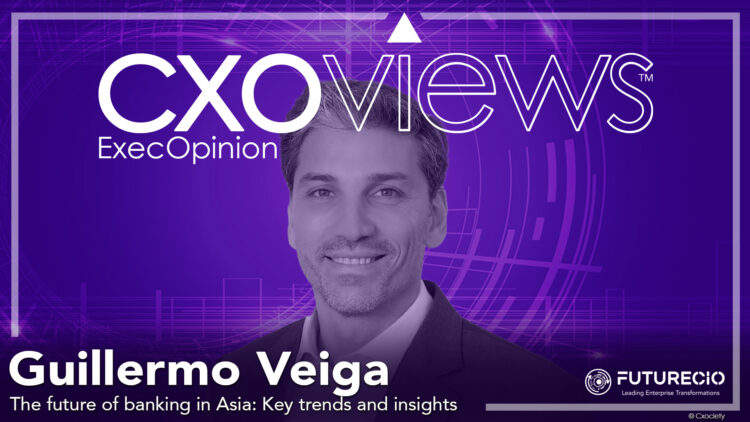A Boston Consulting Group report revealed that the financial wealth in the Asia-Pacific region grew by 5.1% in 2023, with experts anticipating a significant increase through 2028. The report projects the region to contribute nearly 30% of new financial wealth by 2028.

“Hong Kong and Singapore continue solidifying their roles as premier booking centres for high-net-worth individuals (HNWIs). Singapore is growing faster than Hong Kong due to sustained inflows from China, India, and ASEAN, while Hong Kong seeks to reclaim growth by diversifying its offerings,” said Guillermo Veiga, chief information officer of Wealth & Retail Banking at Standard Chartered.
Financial inclusion and digital payments remain dominant in India, with UPI and mobile banking driving adoption. Wealth management is expanding as India sees record growth in new financial wealth. Guillermo Veiga
China’s wealth management sector remains deeply integrated with tech ecosystems, but regulatory shifts have forced consolidation. AI-driven investment advisory and embedded finance solutions continue transforming the industry,” he continued.
Veiga sees economic growth, digital innovation, and evolving regulatory environments will continue to shape Asia’s wealth and retail banking landscape in 2025.
“Across the region, I see Generative AI emerging as a distinct game-changer in wealth management, enhancing personalised client engagement, relationship manager efficiency, and investment content creation,” Veiga said.
Evolving landscape
With trillions in new wealth being created, banks must adapt to remain competitive. This has led to a significant transformation and a shift in how banks and fintech startups interact.
The past decade saw fintech startups positioned as disruptors, challenging traditional banks. However, Veiga believes the narrative has evolved—fintech now plays a complementary role, partnering with banks rather than replacing them.
“Most banks have embraced a “co-opetition” model, partnering with fintechs to enhance digital offerings while retaining customer trust and regulatory expertise,” he said.
One example of this shift is SC Ventures, Standard Chartered’s fintech investment arm, which launched Labamu, an invoicing and billing platform for APAC small and medium enterprises (SMEs).
“Initially rolled out in Indonesia, Labamu provides SMEs with integrated financial services such as embedded banking, procurement, and working capital financing, tapping on the US$2.5 trillion SME market across six Southeast Asia countries that account for 90% of businesses and 80% of employment,” Veiga said.
Beyond fintech collaborations, he believes the fundamental shift has been banking integration into broader tech ecosystems. He added that embedded finance is now a norm, with banks, fintechs, and Big Tech offering seamless, API-driven services.
“Banks that fail to modernise—by leveraging AI, upgrading legacy systems, and improving customer experience—risk losing relevance. As noted in recent reports, Generative AI is accelerating this transformation, with 85% of wealth management leaders believing AI will be highly disruptive,” remarked Veiga.
Addressing concerns
While fintech partnerships and technology innovations have strengthened banking ecosystems, they also introduce new risks and challenges. Among the top concerns, Veiga highlighted cybersecurity and fraud risks as digital transactions increase.
Additionally, with the growing demand for new technology in banking, the talent pool struggles to keep pace. Veiga said talent acquisition remains in short supply with AI, data science, and cybersecurity expertise.
Regulatory compliance remains a challenge, especially navigating complex, evolving rules. Meanwhile, customer expectations, which involve competition from fintech and Big Tech, continue to raise the bar for seamless digital experiences.
Clients and regulators also prioritise Environmental, Social, and Governance (ESG) as they focus more on sustainable finance.
In response, CIOs in banking and finance invest in resilient IT infrastructures, such as cloud adoption and zero-trust security models; AI-driven analytics that enhance customer insights, fraud detection, and compliance; and open banking and embedded finance drive innovation.
Veiga also underscored the need to upskill the workforce by investing in AI training programmes, ensuring long-term readiness, deploying AI-driven regulatory compliance tools, reducing costs, and improving accuracy.
“In my view, CIOs who leverage AI strategically - from fraud detection to hyper-personalised investment advice – are well-positioned to lead in the next phase of banking transformation,” he said.
Technologies to watch out for
Banks that strategically integrate AI while focusing on customer needs and security are likely to take the lead in the industry over the coming years.
To navigate industry challenges, banks are turning to advanced technologies.
Veiga acknowledges that several new technologies will continue to work well in banking and finance in 2025,paving the way for a more efficient and customer-centric industry.
These technologies include AI-powered personalisation, as AI transforms investment content, client interactions, and relationship management; mobile-first strategies, with the proliferation of mobile wallets and digital-first experiences in Southeast Asia; collaborations between banks, fintech, and Big Tech have accelerated embedded finance; and incremental modernisation to legacy systems that minimise disruption.
Veiga cautions organisations against one-size-fits-all tech rollouts or solutions that do not account for local banking habits, cybersecurity oversight that leads to data breaches and financial losses, and over-reliance on legacy systems, with banks failing to invest in AI and automation.
“Banks that strategically integrate AI while focusing on customer needs and security are likely to take the lead in the industry over the coming years,” Veiga said.
Lessons from the past
The rise of new technologies shapes the future of banking and finance in Asia, but the lessons learned from past disruptions, such as the pandemic, remain just as relevant.
“The adage, ‘Those who cannot remember the past are condemned to repeat it’, is very relevant to our sector,” Veiga said.
The adage, ‘Those who cannot remember the past are condemned to repeat it’, is very relevant to our sector.
Reflecting on his experiences as a CIO, he highlights the values of resilience and customer-centric innovation.
“The banks and their technologists that embrace AI, hyper-personalisation, and platform-based business models are looking to dominate the industry over the next decade,” he said.
Moreover, Veiga underlines ESG integration as sustainability is increasingly embedded in investment strategies and banking operations.
Reaching new heights
Veiga advises CIOs to embrace AI to help them reach new heights in the industry. As AI reshapes wealth management, organisations can leverage it to enable smarter investment strategies, fraud detection, and client engagement, ushering in unprecedented innovation and efficiency.
With great technological power comes greater responsibility.
“With great technological power comes greater responsibility - developing internal governance protocols that include ethical considerations for deploying AI and collaborating closely with regulators is key to ensuring that AI use cases deployed adhere to the pillars of fairness, ethics, transparency, and self-accountability,” he added.
Aside from working with regulators, Veiga also underscores the importance of collaborating with fintechs and Big Tech: “APIs and open banking drive faster innovation and seamless integration.”
Moreover, he recommends adopting a platform mindset that empowers leaders to think beyond products and build financial ecosystems with embedded services. He also recommends enhancing AI-powered advisory to personalise investment strategies, automate content creation, and augment RMs.
Cybersecurity remains a priority for Veiga, urging organisations to deploy zero-trust models and real-time AI monitoring.
Finally, despite technological advancements, he emphasises sustainability: “Aligning with ESG principles will attract socially conscious investors and partners.”
The future of banking in Asia
Asia’s banking sector is not just evolving; it is redefining global finance. Those who embrace AI, sustainability, and fintech collaboration will set a new standard for the industry, not only for 2025 but for the years to come.




